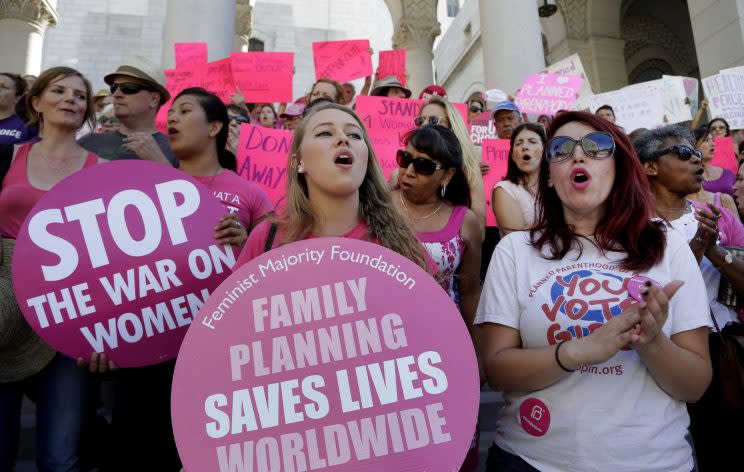Being denied an abortion more harmful to a woman’s mental health than having one: Study

Brittany Sherwood was only 15 when she had an abortion after becoming pregnant the first time she ever engaged in sex. Now in her late 20s, she says she felt the procedure was her only “real choice.”
“Looking back, I’m proud of myself for having the insight to know that I would never be able to give up the child for adoption following a pregnancy and birth,” said Sherwood, who is now a mental health nurse practitioner in southern Florida.
Sherwood’s emotional response to her abortion decision falls in line with a new study from the University of California at San Francisco, which found that women who underwent an abortion were at less risk of adverse mental health effects (such as depression, anxiety, and dissatisfaction of life) than those who were denied an abortion because their pregnancy was further along than the facility’s gestational limit.
The study’s conclusion defies the argument of many abortion protesters — that women who undergo the procedure experience long-term psychological trauma.
The lead author of the study, Antonia Biggs, told Yahoo News that the findings add to a growing body of research that indicates abortion does not lead to negative mental health outcomes for women.
“These data indicate that women should be trusted to make their own decisions regarding their reproductive lives,” said Biggs.
The analysis, which is part of a larger body of reproductive research known as the Turnaway Study, is based on the experiences of nearly 1,000 women who sought abortions between 2008 and 2010 from 30 abortion facilities in 21 states. The ongoing research is intended to examine the effects of unintended pregnancy in women’s lives.
“There should be well-informed, respectful and open discourse between those of us making the life-altering decision,” said Sherwood. “We do a disservice to all women when we are not open about the decision we were faced with, the factors that we considered, and the emotions following the decision at different points in our lives.”
The study’s findings come at a crucial time for abortion laws in the U.S., as President-elect Donald Trump has promised to fill Antonin Scalia’s seat on the Supreme Court with a justice who is an opponent of abortion. Abortion foes have become newly emboldened by threats from Trump and the Republican Party to overturn Roe v. Wade, and some states are adding new limits on abortions. Most recently, Ohio made headlines for banning abortions after 20 weeks, while Texas adopted amendments that require the burial or cremation of fetal remains every time a woman has an abortion.
About half of all pregnancies in the U.S. are unintended, according to the Centers for Disease Control, and of all unintended pregnancies, about four in 10 are aborted. Three out of 10 women in the country will have an abortion by the time they are 45 years old, according to Planned Parenthood. In 2013, a total of 664,435 legally induced abortions were reported to the CDC from 49 reporting areas. The rate of abortion procedures has steadily decreased since 1980.
But the National Right to Life Committee, the nation’s largest anti-abortion advocacy organization, cites information contradictory to the study’s finding on its website, referencing a 1989 congressional “Hearing on Impact of Abortion” to make the case for adverse mental health outcomes after an abortion: Researchers on the after-effects of abortion have identified a pattern of psychological problems known as Post-Abortion Syndrome (PAS). Women suffering PAS may experience drug and alcohol abuse, personal relationship disorders, sexual dysfunction, repeated abortions, communications difficulties, damaged self-esteem, and even attempt suicide.
By studying women’s experiences with receiving and being denied an abortion, the Turnaway study provides the best evidence we have to date on the true effects of abortion on women, Biggs said. Another notable result showed that women who received first-trimester abortions were affected in the same was as those ending pregnancies after three months.
“The findings do not support policies that restrict women’s access to abortion on the basis that abortion harms women’s mental health,” the authors wrote in a summary analysis.
“Policymakers now have conclusive evidence indicating that abortion does not harm women,” said Biggs. “These data should be used to inform policies, so that we can ensure that women receive the most accurate and up-to-date information.”
Currently, 35 states require that women receive counseling before an abortion is performed, and 27 of these states require that women wait a specified amount of time — usually 24 hours — between the counseling and the abortion procedure, according to the Guttmacher Institute. Fourteen of those states require that counseling be provided in person and that the counseling take place before the waiting period begins, therefore requiring two separate trips to the facility.
Twenty-two states require that a woman be informed about the emotional or psychological effects of abortion, and nine of those states specifically require going over negative psychological responses and stress.
“Our results indicate that laws in some states mandating that women be counseled on the negative psychological effects of abortion are not based on evidence,” said Biggs.
Expanding access to abortion, rather than restricting it, is more protective of women’s psychological well-being, she added.
Sherwood, who is a proponent of women speaking openly about abortion, echoed Biggs’s sentiments, stating that there should be more factual, honest conversation about the decision to undergo an abortion.
“This can be a life-altering decision, and you deserve to know how others before you made it,” she said. “You deserve to know what each choice entails.”
